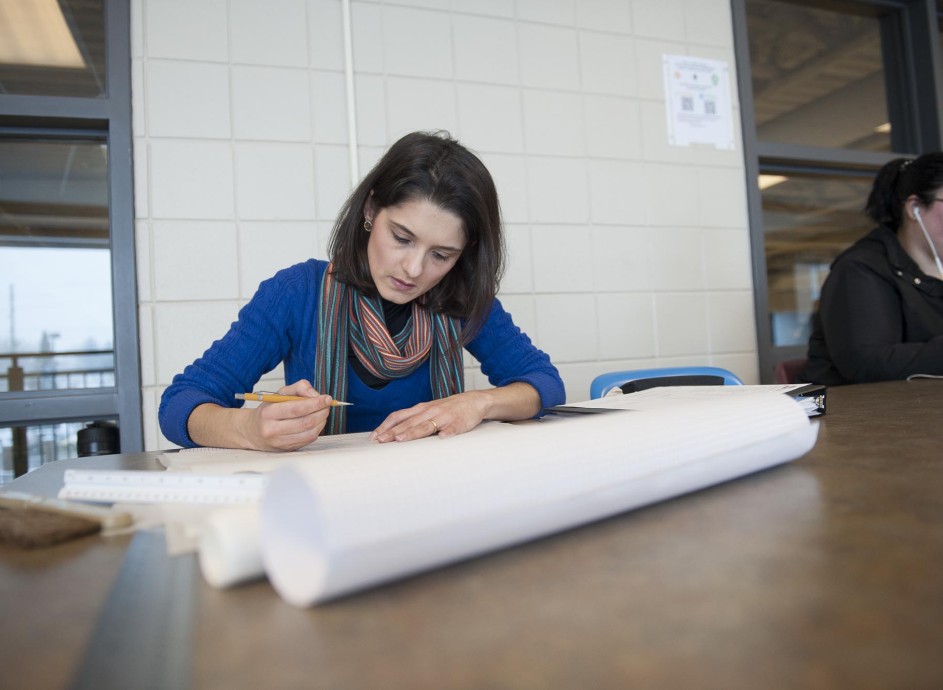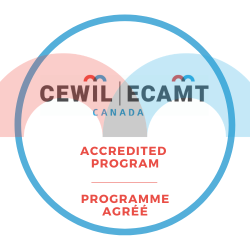Architectural Technology (Co-op)

*Domestic applicants include Canadian citizens, permanent residents, protected persons and Convention refugees.
Combining creativity with the hands-on world of construction, the Architectural Technology program will introduce you to the dynamic, exciting and always in-demand world of building design.
The award winning Architectural Technology program will educate students in all aspects of the Architectural, Engineering and Construction industry. The Architectural Technology program prioritizes project-based learning in a studio environment, offering students knowledge of Architectural Design, Technical Documentation, Engineered Building Systems, Planning, Building Regulations, Building Science and Project Delivery. Students will engage in the Virtual Design and Construction (VDC) of small and large buildings of various types and use a variety of software such as Revit and AutoCAD to complete those documents.
The program focuses on immersive studio simulations, leading edge technologies, sector relevant curriculum with a focus on project-based learning, and prepares graduates for the current construction industry. Scenario-based industry simulation studios classes use the latest technologies and practices to prepare the student to participate in the full scope of construction projects. Students engage in the virtual design and construction (VDC) of small and large buildings of various building type while additionally exploring structural, mechanical and electrical system integrations. The Architectural Technology program consists of six academic terms and three paid work terms over a 3 year period.
The Architectural Technology program offers a cooperative education component providing students the opportunity to gain first-hand workplace experience within professional firms, industrial and commercial corporations or government agencies. Co-op students are qualified for such positions as junior architectural assistant, junior architectural, structural draftsperson, junior CAD technologist, junior BIM technologists, Junior BIM manager, junior field supervisor, junior project coordinators, junior plans examiner/inspector and junior technical representative.
Some examples of career opportunities for graduates of Fanshawe’s Architectural Technology program:
Drafting Team Lead - Manage the daily drafting operation, drawing schedule and coordinate drawings with corporate drafting standards.
Designer/Draftsperson - Designing new buildings or renovation projects, site visits for measurements.
New Home Construction Coordinator - Put your skills to work in a fast-paced industry by coordinating residential construction projects, including managing databases and marketing information on new builds.
Site Supervisors and Project Managers - Manage the daily construction site operations and coordinate trades and completion schedules.
| Fall | Winter | Summer |
|---|---|---|
| Academic Level 1 | Academic Level 2 | Co-op |
| Academic Level 3 | Academic Level 4 | Co-op |
| Co-op | Academic Level 5 | Academic Level 6 |
| Fall | Winter | Summer |
|---|---|---|
| Academic Level 1 | Academic Level 2 | Academic Level 3 |
| Co-op | Academic Level 4 | Academic Level 5 |
| Co-op | Co-op | Academic Level 6 |
| Fall | Winter | Summer |
|---|---|---|
| Academic Level 1 | Academic Level 2 | |
| Academic Level 3 | Co-op | Co-op |
| Academic Level 4 | Academic Level 5 | Co-op |
| Academic Level 6 |

This program is accredited by Co-operative Education and Work Integrated Learning Canada. This accreditation represents the highest standard of achievement for co-operative education programs in Canada, and recognizes Fanshawe's commitment to excellence.
The graduate has reliably demonstrated the ability to
Joel Foster
Ontario Secondary School Diploma (OSSD), or equivalent, or a mature applicant with the following courses:
- Grade 12 English (C or U)
- Grade 12 Math (C or U) - MCT4C preferred*
* A minimum grade of 60% is required for Grade 12 Foundations for College Math (MAP4C). This math course may not provide adequate academic preparation for this program and therefore applicants with this course will be required to take additional preparatory Math as part of their program of study.
Students who do not meet the admission requirements are recommended for academic upgrading. A conditional offer may be possible with proof of enrolment. Alternatively, applicants may choose to do the one-year Pre-Technology preparatory program that provides all the admission requirements for this program.
| Test | Score |
|---|---|
| TOEFL iBT | 79 |
| IELTS Academic | Overall score of 6.0 with no score less than 5.5 in any of the four bands |
| CAEL | Overall score of 60 with no score less than 50 in any of the four bands. score of 80 in listening |
| PTE Academic | 53 |
| Cambridge English | Overall score of 169 with no language skill less than 162 |
| ESL4/GAP5 | Minimum grade of 80% in Level 8, 75% in Level 9, or 70% in Level 10 |
| Duolingo | Overall score of 105, with no score lower than 95 |
| LANGUAGECERT | Overall score of 65 with no score less than 60 in any of the four skills |
| Level 1 | ||||
| Take all of the following Mandatory Courses: | ||||
| ARCH-1001 | Architectural Design 1 | 3 | ||
| This course is an introduction to the elements and principles of design as they relate to Small Buildings. The basic design elements and principles of architectural language, scale, function, circulation, spatial relationships and activities will be studied through stand-alone and project assignments. | ||||
| BIMM-1003 | Architectural Software 1 | 4 | ||
| This course will develop student's knowledge of Building Integrated Modelling (BIM) techniques and using BIM software. Students will perform and develop architectural BIM models. Using BIM software, the students will develop architectural BIM models for various building construction types. | ||||
| WRIT-1039 | Reason & Writing 1-Technology | 3 | ||
| This course will introduce technology students to essential principles of reading, writing, and reasoning at the postsecondary level. Students will identify, summarize, analyze, and evaluate multiple short readings and write persuasive response essays to develop their vocabulary, comprehension, grammar, and critical thinking. | ||||
| DRAF-1059 | Architectural Fundamentals 1 | 3 | ||
| In this course, students will develop the skills necessary to read and produce architectural working drawings. Exercises and small projects will be produced using industry standards of practice. Blueprint exercises will be completed to practice reading/interpreting industry standards and construction methods. | ||||
| MATS-1002 | Materials & Methods 1 | 3 | ||
| This introductory course allows students to gain technical knowledge of common building materials and methods used in the architectural, engineering and construction industry. Students will identify; list; assess and qualify common building materials used for building construction used for various types of construction projects. | ||||
| MATH-1222 | Statics | 2 | ||
| In this course, the student will study forces, types of force systems, vectors, resultants, components, equilibrants, simple structures, method of joints, force diagrams, moments, equilibrium, beam and truss reactions, concentrated loads, and distributed loads. | ||||
| ARCH-1006 | History of Architecture | 3 | ||
| This course is a study of architectural development beginning with ancient and classical architecture, continuing with medieval and renaissance architecture, and concluding with post renaissance, international and modern architecture. Significant developments in style, technology, and techniques of construction will also be studied. | ||||
| MATH-1036 | Mathematics in Technology 1 | 3 | ||
| Students explore the following topics: scientific notation, estimation, basic algebra, trigonometry and radian measure applications solutions of right triangles and carry out mathematical applications in Architectural, Civil and Construction Technology. | ||||
[1] Total program costs are approximate and subject to change. They do not include additional fees such as the health and dental plan, bus pass, or general expenses. Learn more about ancillary and additional fees.